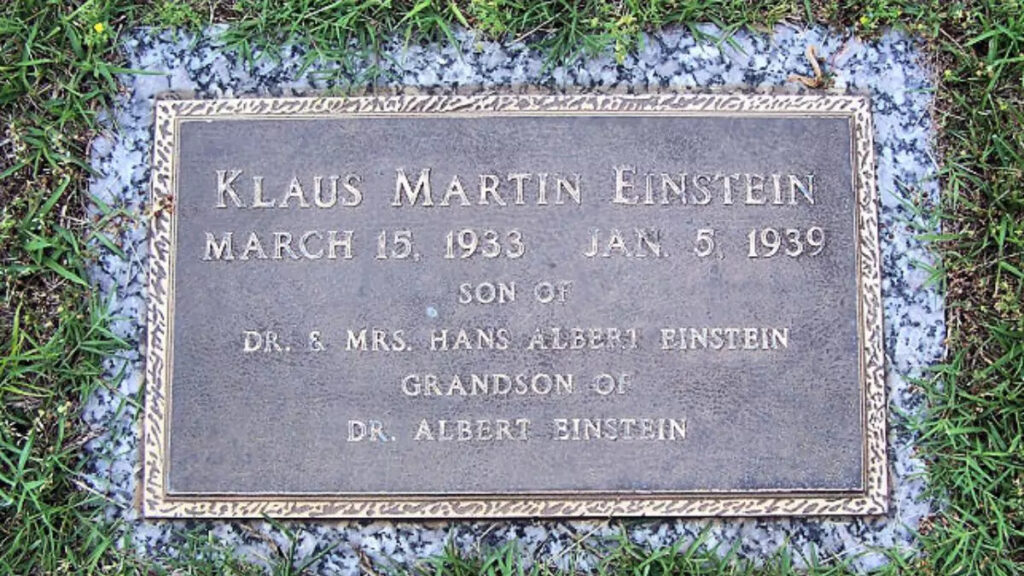The Einstein family is one of the most well-known in the world, primarily due to the scientific contributions of Albert Einstein. However, many members of his lineage also had notable lives, including his son Hans Albert Einstein and grandson Klaus Martin Einstein. Though Klaus Martin Einstein did not have the opportunity to contribute significantly to science or other fields, his life was nonetheless meaningful within the family’s history. This article explores the life of Klaus Martin Einstein, his background, the circumstances of his early death, and his connection to the Einstein legacy.
Early Life and Family Background
Klaus Martin Einstein was born in 1932 to Hans Albert Einstein and Frieda Knecht. His father, Hans Albert, was a distinguished hydraulic engineer, following a different path from his renowned physicist father. The family had emigrated to the United States due to the rise of Nazi Germany, seeking safety and better opportunities.
Hans Albert Einstein settled in the United States, where he pursued his career in engineering, and it was in this backdrop that Klaus Martin Einstein was raised. The Einstein family was known not just for their scientific brilliance but also for their struggles with personal and familial challenges. Klaus Martin Einstein was the second child in the family and had a brother named Bernhard Caesar Einstein, who later became a physicist.
The Einstein Family’s Struggles and Tragedy
The Einstein family endured many hardships, especially in their move from Europe to the United States. While Albert Einstein was granted refuge and prominence in the academic world, his descendants had their own battles to fight. Klaus Martin Einstein, despite being part of such a prestigious lineage, had a difficult life marked by health issues.
Unlike his father and grandfather, Klaus Martin Einstein did not have the chance to leave a substantial academic or professional impact. His childhood was spent mostly in the shadow of his father’s career and under the influence of his famous grandfather. However, tragedy struck early in his life, and he suffered from serious medical conditions that affected his health significantly.
Klaus Martin Einstein’s Untimely Death
Klaus Martin Einstein’s life was cut short at a very young age. In 1939, at just six or seven years old, he passed away due to complications arising from diphtheria. His untimely demise was a major tragedy for the Einstein family, particularly for his father, Hans Albert, who had already suffered multiple personal losses, including the early death of his sister Maja Einstein and the mental illness of his mother Mileva Marić.
The loss of Klaus Martin Einstein left a deep void in the family. His father, Hans Albert Einstein, continued to work as a professor at the University of California, Berkeley, but the sorrow of losing a child is something that never fades. His passing also marked another chapter of loss in the Einstein family’s turbulent history.

Klaus Martin Einstein’s Place in the Einstein Legacy
Although Klaus Martin Einstein did not live long enough to make any groundbreaking achievements, his existence remains a poignant part of the Einstein family’s history. His premature death is a reminder that even the most brilliant families are not immune to personal suffering and loss.
His brother, Bernhard Caesar Einstein, went on to continue the family’s connection to science and technology. Bernhard worked in applied physics and engineering, contributing to several inventions and research efforts in the mid-20th century. However, Klaus Martin’s memory remained within the Einstein family, a symbol of the fragility of life, even within a lineage associated with greatness and intellect.
The Einstein Family’s Continuing Influence
Despite the tragedies that affected various members of the Einstein family, their legacy remains one of immense significance. Albert Einstein’s contributions to physics, particularly the theory of relativity, changed the course of science forever. His son, Hans Albert Einstein, made substantial contributions to hydraulic engineering and influenced many advancements in the field.
While Klaus Martin Einstein’s life was tragically short, his story is an important part of the larger Einstein family narrative. His early death is a testament to the fact that even the families of the most celebrated individuals are susceptible to the universal experiences of grief and loss.
Conclusion
Klaus Martin Einstein may not be as well-known as his grandfather, Albert Einstein, or even his father, Hans Albert Einstein, but his life remains an important part of the Einstein family’s history. His early death due to diphtheria was a tragic loss, and it serves as a reminder of the many personal struggles that even history’s greatest figures and their families must endure. Though he did not have the opportunity to make his own mark in the world, Klaus Martin Einstein’s memory continues to live on as part of the enduring Einstein legacy.
FAQs
1. Who was Klaus Martin Einstein?
Klaus Martin Einstein was the son of Hans Albert Einstein and the grandson of Albert Einstein. Born in 1932, he tragically passed away at a very young age due to diphtheria in 1939.
2. What was Klaus Martin Einstein known for?
Unlike his grandfather and father, Klaus Martin Einstein did not have the opportunity to contribute to science or engineering, as he passed away as a child. However, he remains a part of the Einstein family history.
3. How did Klaus Martin Einstein die?
He died in 1939 from complications related to diphtheria, a severe bacterial infection that was much harder to treat before the widespread availability of antibiotics and vaccines.
4. Did Klaus Martin Einstein have any siblings?
Yes, he had an older brother, Bernhard Caesar Einstein, who later became a physicist and engineer, carrying forward the Einstein family’s connection to science.
5. How is Klaus Martin Einstein related to Albert Einstein?
Klaus Martin Einstein was Albert Einstein’s grandson. His father, Hans Albert Einstein, was Albert Einstein’s second child and only surviving son.
For More Visit Star Trend



























